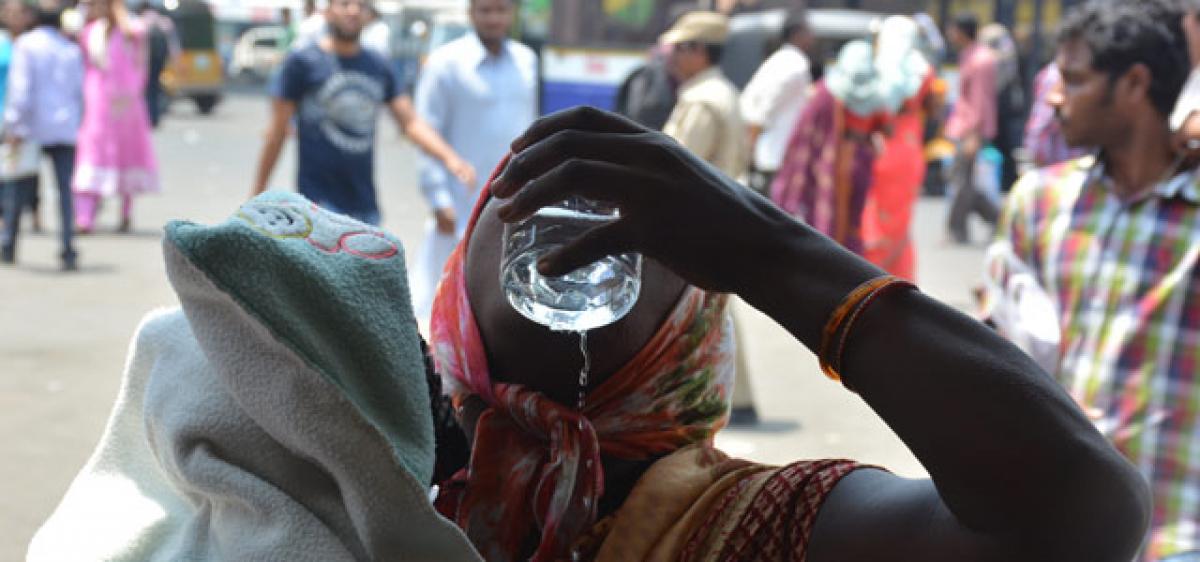Live
- Over 7,600 Syrians return from Turkiye in five days after Assad's downfall: minister
- Delhi BJP leaders stay overnight in 1,194 slum clusters
- Keerthy Suresh and Anthony Thattil Tie the Knot in a Christian Ceremony
- AAP, BJP making false promises to slum dwellers for votes: Delhi Congress
- 'Vere Level Office' Review: A Refreshing Take on Corporate Life with Humor and Heart
- Libya's oil company declares force majeure at key refinery following clashes
- Illegal Rohingyas: BJP seeks Assembly session to implement NRC in Delhi
- Philippines orders full evacuation amid possible volcanic re-eruption
- Government Prioritizes Welfare of the Poor, says Dola Sri Bala Veeranjaneyaswamy
- Two Russian oil tankers with 29 on board damaged due to bad weather
Just In

Water is the elixir of life, no dispute, but it is also the carrier of deadly microorganisms that can be lethal if extreme care is not taken in storing and supplying it.
Experts raise concern over safety of water supplied by hundreds of free drinking water supply centres
Hyderabad: Water is the elixir of life, no dispute, but it is also the carrier of deadly microorganisms that can be lethal if extreme care is not taken in storing and supplying it.
With the mercury soaring like never before with each passing summer, the life-giving liquid is fast becoming a commodity not so aplenty.
While the scorching sun sucks all the energy of millions of people who venture out for their work and businesses in these midsummer days, water has become scarce and the common public have to depend on hundreds of water-serving centres that are dotting the city streets, thanks to a handful of NGOs, philanthropists and Good Samaritans.
But one question that puzzles us is how safe is this water to drink. It is true that during summer days, one finds these free drinking water centres as great relief and quenches one’s parched throats.
Though the intention behind the service is good, on a larger scale, the water provided can be a cause of concern for people who consume it.
To set up a free water distribution centre (chalivendram), one needs to acquire permission from the Hyderabad Metropolitan Water Supply and Sewerage Board (HMWSSB).
The water is then collected from a filling station close to the area where the camp is being set up. According to an official in the Water Board, the water provided for these centres is safe for consumption but cleaning the containers and changing water often is the responsibility of the volunteers who organise the camp.
The scorching heat can force one to consume water from roadside free water centres which are usually left unattended. Consuming water from earthen pots is proved healthy scientifically, provided that one follows all precautionary measures. Earthen pots can retain water and collect scum quickly.
To avoid, that one needs to scrub, clean and dry the pot after each use before refilling it. Water camps, where the water is stored in such pots are usually left unattended by a person concerned that leaves the water unsafe for consumption.
“While travelling for work we usually carry our water but because of the heat, the water we carry is not always sufficient. Hence, we refill our bottles from these water centres and moreover, the water stored in earthen pots is cold. While drinking the water we do not think about safety because that will force us to stop drinking water.
It is again not good for us to go without water for hours,” said a daily wage worker. The organisers should ensure that the water camps have proper security and hygienic care so that good potable water is provided for the thirsty and not contaminated by anti-social elements.
Apart from earthen pots, there are other water camps where the water is stored in containers and served by an attendant. One such water camp organised in Khairtabad follows all the safety measures, but lacks an official permission.
When questioned about it, one of the members from the camp said, “We are doing good work. Why do we need permission for that? The water we provide is clean and good for consumption as it is bottled water.” But without permission the water quality cannot be guaranteed for. Many private organisations provide bottled drinking water but the quality of the water should be tested before consumption.
One such volunteer, Mirza Asif Baig, who organises a free water camp in Castle Hills Colony near Masab Tank says, “I make sure to change the water every day. If I am not available to change the water, then some other members do it. Every time we change the water, we make sure to scrub the pot clean first and then fill it.”
By: L PAVANI KODATI

© 2024 Hyderabad Media House Limited/The Hans India. All rights reserved. Powered by hocalwire.com







